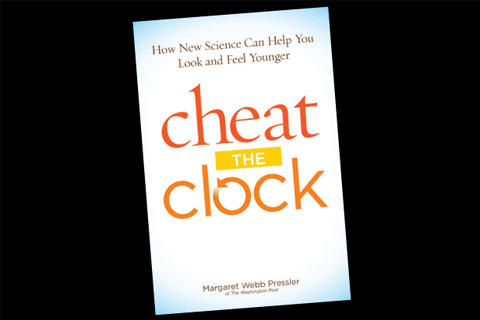Can You Cheat the Clock?

Cheat the Clock by Margaret Webb Pressler (Alpha Books, 2012) ought to fly off the bookstore shelves, but it might not. It’s too sensible, too reasonable. It won’t sell well among those desperately looking for a silver bullet to overcome the difficulties of aging successfully, losing weight, getting fit, reducing stress, and so on. This book does not promise the instant gratification of looking 20 years younger in ten days by using ABC Miracle Product or joining XYZ Miracle Exercise Program.
Pressler takes the long view and advocates taking baby steps that add up handsomely over several years of almost effortless change. Her full title, How New Science Can Help You Look and Feel Younger: Cheat the Clock, will intrigue readers interested in understanding why some well-publicized age-proofing efforts work while others don’t. Well grounded in the latest scientific studies on aging, the book is a reliable guide for those willing to learn how to do their part in staying youthful and active later in life.
As a journalist for The Washington Post, Pressler read widely in the field of aging research and interviewed scientists conducting the latest studies. Her approach that summarizes the technical details in small, easy-to-read chunks nicely mirrors her thesis on aging: Make small, modest changes over time. She also argues persuasively that it’s never too late to start. Even the bed-ridden in nursing homes can improve to the point of “spending less time in bed, showing more alertness, having a better outlook.”
Chapters include good information on nutrition; exercise; brain science; stress, sleep, and sex; and happiness and well-being. Pressler bookends these topics with an opening that summarizes the new science on aging and a closing that presents an action plan for looking and feeling younger than your years. If you have followed press reports on the science of aging, you might not find a great deal of new material in Cheat the Clock. For example: The news that shortened telomeres make you old came out almost 40 years ago. However, Pressler presents the science of aging in a thoroughly palatable way, even for readers with little scientific background.
Cheat the Clock, however, is no dull compilation of scientific papers. Pressler uses her husband, Jim, as an example of successful aging. At 64, he looks and apparently feels as young as his wife, who is 17 years his junior. As a successful lawyer with a young family, he may be well motivated to stay as young as possible but, according to the author, he has always sought simple, easy ways to live a healthy, active life. He’s a living example of the good effects of cumulative exercise; a few minutes several times a day works for him and can work for everyone who keeps it up.
Using a well-reasoned, moderate, friendly, but ultimately persuasive writing style, Pressler deftly strips away every excuse for not taking control over your own aging process. For example: After a shout-out to Darren Hardy’s The Compound Effect, which extols the cumulative approach, Pressler noted, “The only problem with [Hardy’s] advice is that people have a hard time starting small because small steps often don’t show measurable results right away. But that’s not the way to think of it. Rather than focus on the results of your exercise, think of it as maintenance work. Taking small steps toward healthy aging is like putting oil in your car or keeping your kitchen tidy. Aging needs the same attention: if you don’t keep it up, the result isn’t pretty.”
Pressler sprinkles the book with sound, practical “Clock-Cheater Tips,” such as this one: “If you want to start eating less but have a hard time dieting, give yourself a longer time frame. Set a goal of reducing one part of your diet every couple of weeks by just a little bit, and give yourself a chance to get used to it. When you do, pick something else. After a year, you’ll have made a noticeable dent in what you eat, and it won’t feel like a diet. The next year, you can either keep going, or depending on how much you’ve reduced your calories, watch the weight slowly come off.”
Obviously, there’s no real “cheating” in this book or in real life. However, you can fool the mirror and other people into thinking you are younger than your chronological age. You’re never too old or too young to do the maintenance work that leads to successful aging.






